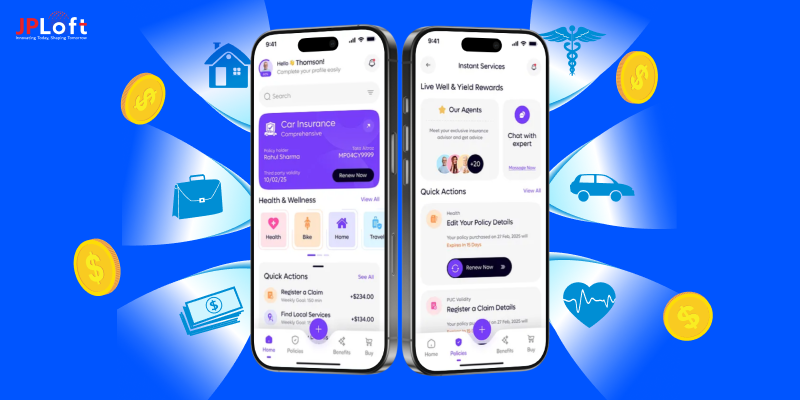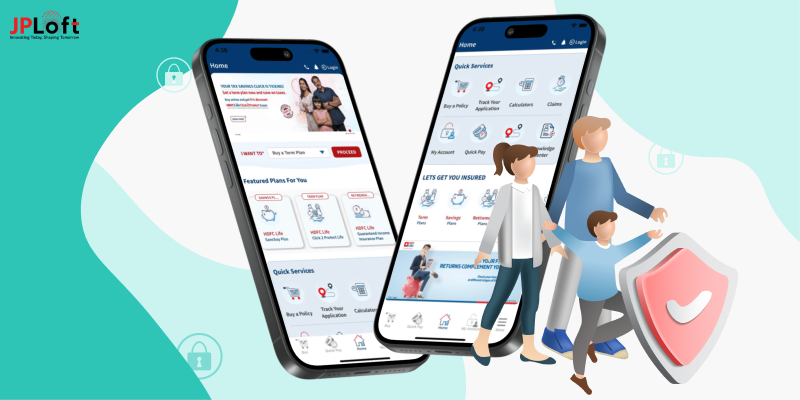Key Takeaways
The insurance industry is moving rapidly toward mobile-first solutions, making this the best time to explore app-based opportunities.
From health, car, and life insurance to niche areas like micro-insurance, blockchain, and pet insurance, there are 18 powerful insurance app ideas to try in 2025 worth exploring.
Digital insurance apps improve customer experience through faster claims, transparency, and personalization.
Emerging technologies like AI, IoT, and blockchain are shaping the next generation of apps.
Startups and businesses can leverage these best insurance app ideas in 2025 to capture growing market demand and boost profitability.
Success depends on choosing the right idea, adopting innovative tech, and focusing on customer-first design.
Partnering with experts like JPLoft ensures you get the right technology stack, seamless execution, and a future-ready insurance app.
The insurance industry is undergoing a massive digital transformation, and mobile apps are at the center of this shift.
From car and health to life and property, people now expect fast, transparent, and convenient insurance solutions right from their smartphones.
For entrepreneurs and businesses, 2025 offers an excellent opportunity to explore insurance app ideas in 2025 that not only address consumer needs but also maximize profitability.
With technology like AI, ML, and automation shaping the sector, the potential is greater than ever. In this blog, we’ll explore the best insurance app ideas to invest in 2025, why they’re worth considering, and how you can start building your own successful insurance app.
What is an Insurance App?
An insurance app is a mobile application designed to simplify how customers purchase, manage, and claim insurance policies. Instead of visiting an office or dealing with endless paperwork, users can handle everything from policy comparison to claim settlement with just a few taps on their smartphones.
These apps come in different forms, ranging from health, car, and life insurance to travel and property coverage. For insurers, they open new opportunities to engage customers, provide 24/7 support, and reduce operational costs. For customers, they mean convenience, transparency, and faster claim processing.
When exploring insurance app ideas to try in 2025, businesses often focus on combining user-friendly features with advanced technologies like AI-based claim verification, chatbots for instant support, and secure payment systems. The result is an app that not only attracts new policyholders but also improves customer retention.
From a business perspective, the ability to create a mobile app tailored for insurance services is no longer optional; it’s essential. Entrepreneurs and startups can tap into insurance app ideas in 2025, such as policy tracking, digital KYC, and fraud detection systems, to differentiate themselves in a competitive market.
In short, an insurance app bridges the gap between traditional insurers and modern customers by offering a seamless, digital-first insurance experience.
All About the Insurance App Market
The insurance industry has been quick to embrace digital transformation, and mobile apps are now at the heart of this revolution.
With rising consumer demand for speed, transparency, and personalization, the insurance app market is expanding rapidly. Here are some key insights:
1] Insurance App Market Highlights
-
Global Growth: The digital insurance platform market is projected to reach $207.52 billion by 2030, growing at a CAGR of over 12.5% from 2025 to 2030.
-
Mobile-First Usage: More than 65% of policyholders worldwide prefer mobile apps for purchasing or managing insurance policies.
-
AI Integration: Around 60% of insurers plan to integrate AI and automation into their apps by 2025, enhancing fraud detection and claims processing.
-
Customer Retention: A report from WifiTalents (June 2025) highlights that mobile app engagement increases retention rates by up to 80%.
-
Startup Boom: As of mid-2025, over 4,000 InsurTech companies are active globally, reflecting the launch of approximately 300 new startups in the year alone.
2] The Role of Technology in Insurance Apps
Companies that create an AI app for claims and risk assessment are gaining a competitive edge by reducing manual intervention.
Leveraging AI app development services allows insurers to build apps with features like chatbots, predictive analytics, and personalized policy recommendations.
Startups are increasingly exploring insurance app ideas to try in 2025 that focus on niche areas such as micro-insurance, wellness-based premiums, and telematics-driven car insurance.
In short, the future of Insurance apps, 2025, is driven by consumer demand, advanced tech adoption, and a surge in startups. Businesses investing in these trends can secure a profitable position in the future of insurtech.
Best Insurance App Ideas to Invest in 2025
Wondering what the top insurance app ideas are to invest in 2025? From AI-driven claims apps to IoT-based home insurance solutions, these innovative concepts are reshaping the future of insurance apps in 2025.
1. Car Insurance Apps with Telematics
One of the most promising insurance app startup ideas for 2025 is car insurance apps powered by telematics. These apps track driving behavior, speed, braking, mileage, and calculate premiums based on real-time data.
Such personalization not only reduces costs for safe drivers but also builds customer trust. Many users ask, “Are Car Insurance apps a good idea?” The answer is yes, especially as usage-based insurance continues to grow globally.
This is a high-potential space for startups that want to blend technology with customer-first solutions.
Example: Allstate’s Drivewise and Progressive’s Snapshot use telematics to adjust premiums dynamically.
2. Health Insurance Apps
Health insurance apps remain among the top insurance app ideas because of their universal need. They allow users to view policies, file claims, schedule medical check-ups, and even earn wellness rewards for healthier lifestyles.
With AI integration, these apps can also offer preventive health recommendations. Startups that innovate in this segment can easily attract young and health-conscious users who prefer mobile-based solutions over traditional processes.
Example: UnitedHealthcare’s mobile app lets users check benefits, find doctors, and track wellness incentives.
3. AI-Powered Claim Processing Apps
Delays in claim settlements are a major pain point for customers. Effective insurance app ideas for 2025 include AI-powered apps that automate claim verification, detect fraud, and process settlements in hours instead of weeks.
With machine learning, these apps can assess documents, analyze risks, and streamline approvals. For insurers, this reduces operational costs, while customers enjoy faster resolutions, making this a win-win innovation.
Example: Lemonade uses AI-driven claim bots that approve many claims within minutes.
4. Travel Insurance Apps
Travel is back on the rise, and so is the demand for digital insurance coverage.
A list of the best insurance app ideas for 2025 would be incomplete without travel insurance apps. These apps provide instant coverage for flight delays, lost luggage, or medical emergencies abroad.
With real-time assistance and easy claims, they offer peace of mind to frequent travelers. Adding AI chatbots further improves the experience by offering immediate policy guidance during emergencies.
Example: Allianz TravelSmart offers policy management, claim filing, and 24/7 travel support.
5. Life Insurance Apps
Life insurance remains a cornerstone of financial security, but managing policies can be complex. A life insurance app simplifies this by helping users calculate coverage, view policy details, update beneficiaries, and make premium payments.
By integrating secure document storage and personalized calculators, these apps can appeal to a wide demographic. For entrepreneurs, this is one of the best startup insurance app ideas for 2025 because it combines stability with mass-market demand.
Example: MetLife Infinity allows customers to manage life insurance digitally and securely store important documents.
6. Pet Insurance Apps
With pet ownership rising globally, pet insurance is becoming mainstream. These apps allow users to ensure veterinary treatments, medications, and even surgeries.
Features like digital claim submission, vet locator, and preventive care reminders make them highly valuable for pet parents.
This segment presents fresh insurance company app ideas that cater to an emotional yet practical need, offering a profitable niche for startups entering the insurtech world.
Example: The Healthy Paws Pet Insurance app enables users to submit claims with just a photo of their vet invoice.
7. Property & Home Insurance Apps
Managing home or property insurance can be overwhelming, especially with multiple policies. A property insurance app lets homeowners track their coverage, submit claims for theft or natural disasters, and even get repair service recommendations.
With IoT devices like smart alarms integrated, insurers can also provide proactive protection alerts. This falls under top insurance app startup ideas for real estate owners and property investors seeking convenience and safety.
Example: The State Farm Homeowners app supports claim filing and integrates with smart home devices.
8. Micro-Insurance Apps
A groundbreaking addition to insurance mobile app ideas is micro-insurance. These apps target underserved communities by offering small, affordable policies for crops, health, or daily income protection.
By keeping premiums as low as a few dollars a month, they make insurance accessible to millions who were previously excluded. For impact-driven startups, micro-insurance presents both profitability and social good.
Example: BIMA offers mobile-based microinsurance services in emerging markets.
9. Business & Commercial Insurance Apps
Small and medium businesses need coverage for property, liability, and employee benefits. A dedicated commercial insurance app streamlines this by allowing business owners to manage multiple policies in one place.
Entrepreneurs who hire dedicated developers to build such platforms can tap into the massive B2B insurance market. Given the rise of startups worldwide, this is one of the most practical insurance app startup ideas in 2025.
Example: Next Insurance provides small businesses with app-based coverage and instant certificate downloads.
10. Wellness-Integrated Insurance Apps
Customers today expect value beyond just coverage. Wellness-integrated apps reward users with premium discounts when they exercise regularly, track steps, or maintain healthy habits.
These apps combine fitness tracking with insurance management, making them among the top insurance app ideas for 2025. Insurers also benefit by reducing claims through healthier customer behavior, creating a strong win-win business case.
Example: Vitality offers discounts and rewards based on fitness activities tracked via wearables.
11. Blockchain-Based Insurance Apps
Fraud and lack of transparency are common challenges in the insurance industry. Blockchain technology can solve this by ensuring every policy and claim is securely recorded and tamper-proof.
Blockchain-powered apps build trust while automating settlements via smart contracts. For entrepreneurs, this is one of the most effective insurance app ideas for 2025, especially in markets where trust in insurers is low.
Example: Etherisc uses blockchain to power decentralized insurance platforms.
12. Cybersecurity Insurance Apps
With cyberattacks on the rise, businesses and individuals need protection against digital threats. Cybersecurity insurance apps can cover damages from hacking, phishing, and data breaches.
These apps are especially valuable for SMEs and freelancers handling sensitive data. Partnering with a mobile app development company in the UK can help startups build region-specific solutions for this growing global need.
Example: Coalition provides cybersecurity insurance and integrates risk assessment tools in its app.
13. On-Demand Insurance Apps
Sometimes customers don’t need year-long policies; they need instant, short-term coverage. On-demand insurance apps provide temporary coverage for trips, rented vehicles, or even gadgets.
This flexible model attracts digital-first customers who want convenience and cost-efficiency. As part of a list of best insurance app ideas for 2025, this concept is gaining momentum among millennials and Gen Z users.
Example: Trov allows users to activate/deactivate insurance for electronics or cars on demand.
14. Insurance Aggregator Apps
Many customers find it hard to compare multiple insurers at once. Aggregator apps solve this by showing policies from different providers with transparent pricing and reviews.
They also allow users to switch or upgrade plans seamlessly. Startups can leverage mobile app maintenance services to ensure smooth integrations with insurers’ APIs.
With customer-first convenience, these apps will continue to dominate the insurtech space in 2025.
Example: Policybazaar (India) and Compare.com (US) let users compare insurance options instantly.
15. IoT-Driven Insurance Apps
Internet of Things (IoT) devices like smartwatches, fitness bands, and connected cars generate valuable data. Insurers can use this data for personalized premiums and real-time monitoring.
IoT-driven insurance apps empower users with proactive insights while enabling insurers to reward low-risk behaviour.
For startups, this falls under top insurance app startup ideas, blending cutting-edge tech with practical benefits.
Example: John Hancock’s Vitality program uses wearables to adjust life insurance rates.
16. AI Chatbot Insurance Advisors
Navigating insurance terms can be confusing. Apps with AI-powered chatbots act as 24/7 advisors, guiding users to select the best policy or resolve queries instantly.
For startups aiming to deliver smarter, real-time solutions, one approach is to build an AI app that integrates intelligent chat support with insurance workflows.
By integrating natural language processing, these apps create personalized experiences. Leveraging insurance mobile app ideas like chatbot assistance is one way startups can stand out while reducing customer support costs.
Partnering with an experienced AI chatbot app development company can ensure robust features, scalability, and seamless integration with existing insurance systems.
Example: Lemonade’s AI Maya chatbot helps customers purchase policies and settle claims.
17. Senior Citizen Insurance Apps
Elderly customers often require specialized coverage for health, life, or long-term care. A senior-focused insurance app provides easy-to-read dashboards, medication reminders, and policy management for caregivers.
This niche solution represents one of the best startup insurance app ideas for 2025, as aging populations across the globe seek accessible digital insurance tools.
Example: Oscar Health app includes senior-friendly features for policy management and telehealth services.
18. Insurance Marketplace Apps
Finally, one of the top insurance app ideas for 2025 is building a marketplace app. These platforms host multiple insurers and categories (car, health, life, cyber, pet, etc.) in a single place.
Users can compare, purchase, and manage all policies seamlessly. For entrepreneurs, this model offers scalability and long-term growth, making it a smart addition to the future of insurance apps in 2025.
Example: Insurify and Gabi offer multi-insurer comparisons with AI-based recommendations.
Having explored the most promising insurance app ideas for 2025, the next big question is: why should startups and businesses actually invest in building these solutions?
The answer lies in market demand, revenue opportunities, and the transformative role of technology in insurance.
Why Invest in Insurance App Ideas?
The global insurtech industry is thriving, with digital-first insurance solutions reshaping how policies are purchased and managed.
For entrepreneurs and enterprises, the question isn’t whether to invest; it’s what are the top insurance app ideas to invest in 2025? Here are the top reasons:
► Growing Consumer Demand
Today’s customers prefer mobile-based solutions for everything from banking to healthcare, and insurance is no exception.
Exploring insurance app ideas in 2025 allows you to meet this demand, offering speed, transparency, and personalized experiences that build long-term loyalty.
► Revenue Potential in a Rising Market
The insurtech market is projected to reach $152.43 billion by 2030, with apps driving the majority of growth. By leveraging niche-focused solutions like car, travel, or micro-insurance apps, businesses can tap into recurring revenue streams. Partnering with the best mobile app development company ensures your product is scalable and ready for future expansion.
► Cost Efficiency with Digital Processes
Insurance apps reduce manual paperwork, streamline claim settlements, and automate fraud detection, all of which cut operational expenses. While the mobile app development cost depends on features and complexity, the long-term ROI of digital transformation outweighs the initial investment.
► Competitive Advantage Through Technology
Modern insurers are integrating AI, IoT, and blockchain into their offerings.
By choosing the right mobile app tech stack, you can build advanced apps with predictive analytics, telematics, and real-time monitoring. This creates a strong competitive edge in attracting tech-savvy users.
► User Experience as a Differentiator
Insurance is complex, but apps can make it simple. Intuitive mobile app design improves navigation, policy management, and claims tracking, directly influencing customer satisfaction. Startups that focus on UX/UI stand out in a crowded market and enjoy stronger customer retention.
Partner With JPLoft and Get Started!
Building a successful insurance app requires the right mix of technology, strategy, and industry expertise. That’s where JPLoft comes in.
As a trusted insurance app development company, we specialize in creating innovative, secure, and user-friendly insurance solutions tailored to your business goals.
Whether you’re a startup exploring new insurance app ideas or an established firm looking to modernize your services, our team can help you bring your vision to life.
With cutting-edge technologies, skilled developers, and a customer-first approach, JPLoft ensures your insurance app stands out in a competitive market.
Partner with us today and take the first step toward transforming your insurtech journey.
Conclusion
The insurance industry is entering an exciting phase where technology and innovation are redefining customer expectations.
From AI-powered claim processing to micro-insurance and telematics-driven auto coverage, the opportunities are endless for entrepreneurs and businesses ready to innovate.
By investing in the right insurance app ideas, you can create solutions that not only simplify policy management but also add real value to users’ lives.
As 2025 unfolds, the winners will be those who embrace digital-first strategies, focus on customer needs, and leverage technology to build scalable, secure, and impactful insurance apps. The time to act is now because the future of insurance is mobile.
FAQs
An insurance app is a mobile application that allows users to buy, manage, and claim insurance policies digitally. It simplifies policy management, offers instant support, and ensures faster claim settlements, all from a smartphone.
Yes, modern insurance apps use advanced security measures like data encryption, multi-factor authentication, and blockchain to protect sensitive customer information. Choosing a trusted development partner ensures compliance with regulations and secure transactions.
Insurance apps help companies reduce operational costs, improve customer engagement, and boost retention rates. They also open new revenue streams through personalized policies, digital claims, and subscription-based models.
Absolutely. Recent studies show that over 65% of policyholders prefer mobile apps for buying and managing insurance. Convenience, transparency, and instant support make them the go-to choice for modern customers.
Yes. With growing demand for niche solutions like microinsurance, pet insurance, or AI-driven claims, startups have plenty of room to innovate. The right development strategy and technology can help them compete with established insurers.
Some of the top insurance app ideas to invest in 2025 include car insurance apps with telematics, AI-powered claim processing apps, travel insurance apps, health insurance platforms, micro-insurance apps, and blockchain-based solutions.












Share this blog